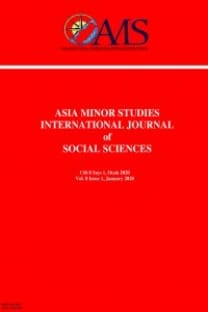İdeal Arayışı ve Sanat-Nesnesinin Gerçekliği; D. G. Rossetti’nin Eserlerinde Metinlerarasılık, Antilogike, ve Öz Farkındalık.
D. G. Rossetti'nin eserleri ideal arayışında bir estetisyen olarak şairin, gerçeklik kavramını önceden belirlenmiş sınırlamalarından nasıl özgür bıraktığını ortaya koymaktadır. Çoğunlukla tekrar müzakere için açık bir alan oluşturmaktadır. Ünlü şiirleri “The Blessed Damozel” ve “The Burden of Nineveh,”da Rosettti, metinlerarasılığı uygular ve diyalektik şiirin potansiyelini gösterir. Estetiğin kalitesine odaklanması ve ana fikrin yıkılması, yorumlayıcı belirsizliği temin eder. Bu şekilde bir belirsizlik, karışıklıktan daha ziyade şiirsel öz farkındalığı sağlar. Ayrıca sanatsal bir süreç veya sanatsal nesnenin kendisi olarak bir nesneden oluşabilen gerçekliğin gelecekteki algılarını işaret eder. Bu çalışma, antik (platonik) felsefenin estetik ve gerçeklik ile felsefi gerçekçilikte çağdaş düşüncelere olan ilişkilerini ortaya koymaktadır. Asıl olarak, Viktorya dönemi şairin ayırt edici iki eserine, sanatsal bir nesnenin nasıl çalıştığına dair bir durak olarak odaklanmaktadır. Aynı zamanda, estetiğin kalitesi üzerindeki tutarlılığından ziyade herhangi bir sorumluluktan bağımsızlaşır, gerçekliği sağlayan diyalektik, yüksek biliş durumu, süreçleri gösterebilir.
The Pursuit of the Ideal and the Reality of the Art-Object: Intertextuality, Antilogike, and Self-awareness in the Works of D. G. Rossetti
D.G. Rossetti's works reveal how the poet, as an aestheticist through his pursuit of the ideal, frees the concept of reality from pre-given limitations. He mainly creates an open field of renegotiation, even introducing an alternative understanding of real and authentic. In his famous poems "The Blessed Damozel" and "The Burden of Nineveh," Rossetti applies intertextuality and signifies the potential of dialectic poetry. His focus on aesthetic qualities and the subversion of the subject matter assures interpretative ambiguity. This kind of ambiguity rather than confusion achieves poetic self-awareness and omens future perceptions of reality, which can be composed by an object, as an artistic process, or the artistic object itself. This article recognizes the links of ancient (Platonic) philosophy on Aesthetics and Reality with contemporary opinions in Philosophical Realism. However, it mainly focuses on two distinctive works of the Victorian poet as a contemplating station of how an artistic object, freed from any responsibility except its consistency on its aesthetic qualities, can signify dialectic (higher state of cognition) processes affording reality.
Keywords:
D.G. Rossetti, Reality, Intertextuality, Antilogike Object,
___
- Althusser, L. (1971). Ideology and ideological state apparatus. In B. Brewster (Trans.) Lenin and philosophy and other essays, 85-126, New York: Monthly Review Press.
- Coleridge, S. T. (2012). Rime of the ancient mariner. In S. Greenblatt (Ed.), The norton anthology of English literature, 9/2, 443-459, London, New York: Norton & Company.
- Coleridge, S. T. (2012). Kubla Khan. In S. Greenblatt (Ed.), The norton anthology of english literature, 9/2, 459-462, London, New York: Norton & Company.
- Eagleton, T. (1990). The ideology of the aesthetic. Oxford: Blackwell Press.
- Ferber, M. (1999). A Dictionary of literary symbols. Cambridge: Cambridge University Press.
- Harman, G. (2018). Object-oriented ontology: A new theory of everything. UK: Pelican Books.
- Harrison, A. (1989). Dante Rossetti: Parody and ideology. Studies in English literature, 1500-1900, 29/4, 745-761.
- Keats, J. (1990). John Keats: The major works. In E. Cook (Ed.), Oxford: Oxford University Press.
- Keats, J. (1990). Letter to B. Bailey, March 13 1818. In E. Cook (Ed.) John Keats: The major works, 381-383, Oxford: Oxford University Press.
- Keats, J. (1990). Ode to a nightingale. In E. Cook (Ed.) John Keats: The major works, 285- 288, Oxford: Oxford University Press.
- Keats, J. (1990). Ode on a Grecian urn. In E. Cook (Ed.) John Keats: The major works, 288- 289, Oxford: Oxford University Press.
- Moore, C. (2012). Socrates psychagogos. Socratica III. In S. F. Rossetti (Ed.), 1- 19.
- Morris, P. (Ed.), (2003). The Bakhtin reader: Selected writings of Bakhtin, Medvedev and Voloshinov, London: Arnold publishers.
- Plato. (2008). Symposium, Benjamin, Jowett, Trans., November 7, 2008. Project Gutenberg, www.Gutenberg.org/1/6/0/1600/.
- Plato. (2008). Republic, , Benjamin, Jowett, Trans., August 27, 2008. Project Gutenberg, www.Gutenberg.org/1/4/9/1497/.
- Plato. (2008). Phaedrus, , Benjamin, Jowett, Trans., October 30, 2008. Project Gutenberg, www.Gutenberg.org/1/6/3/1636/.
- Πλάτωνας. (2015). Φαίδρος, December 3, 2015, http://el.wikisource.org/w/index.php?title= Φαίδρος&oldid=55461
- Rossetti, D. G. (2012). The blessed damozel. In S. Greenblatt (Ed.), The norton anthology of English literature, 9/2, 1472-1476, London, New York: Norton & Company.
- Rossetti, D. G. The burden of Nineveh. The Victorian web: Literature, history, and culture in the Victorian age, http://www.victorianweb.org/authors/dgr/5.html.
- Spector, S. J. (1971). Love, unity, and desire in the poetry of Dante Gabriel Rossetti. ELH, 38/3, 432-458.
- Stillinger, J. (Ed.). (2000). Dante Gabriel Rossetti: 1828-1882. The norton anthology of english literature,7/2, London, New York: Norton & Company.
- Uhlig, C. (1985). Literature as textual palingenesis: On some principles of literary history. NLH, 16/3, 481-514.
- ISSN: 2147-1673
- Yayın Aralığı: Yılda 2 Sayı
- Başlangıç: 2013
- Yayıncı: Serhat KUZUCU
Sayıdaki Diğer Makaleler
Western Women as Subject in Orientalist Texts: An Example of Lady Montagu’s Turkish Embassy Letters
Halk Anlatılarına Göre Kilis’te İlginç İnanışlar ve Olaylar
Özbek Masallarında Halk Hekimliği Uygulamaları
Emirdağ İlçesinde Yaşayanları Göçe Zorlayan Temel Sebepler
Abdullah KARA, Mustafa ÇAVDAROĞLU
Cephe Tasarımında Sembolizm ve İsmailiye Sarayı Cephesindeki Değişim Süreci
Didem ERTEN BİLGİÇ, Zeyneb TAHİRLİ
Asker Anıları Işığında İkinci Dünya Savaşı Türkiye'si
